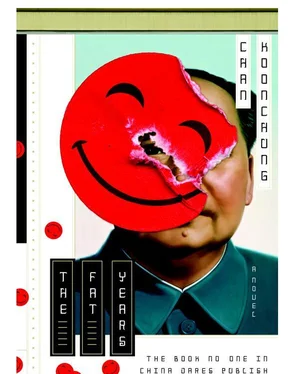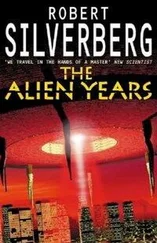“Well, it’s been great talking to you, Wei Guo, but I need to get going.” He must have thought I was pretty backward.
“Have a good time in Beijing. Write more articles on the true face of China so our Taiwanese compatriots won’t so easily believe the Western media.”
I was about to ask him to tell his Grandma I was leaving, when she appeared.
“Leaving already?”
“I have some business on the Eastside, so I’d better leave early to beat the traffic.”
“Come back when you can and have some Guizhou goose.”
“Of course … You take care of yourself, Big Sister.”
As we shook hands, Big Sister slipped me a piece of paper. We both felt a little reluctant to part.
Just as I was reaching the door, Wei Guo turned to me with a cold look. “Master Chen, have you seen my mom lately?”
“No,” I lied.
He said good-bye politely, and I nodded back. I couldn’t help taking another look at his snow-white sneakers. The year of Lao Chen’s zodiac sign
This year is the year of my zodiac sign, and a lot of strange things are bound to happen. Things like getting so worked up that I burst into tears, or like meeting Little Xi and Fang Caodi one after the other after such a long time — I think all these things are vaguely connected.
It’s been a long time since I’ve run into anyone so completely out of tune with the prevailing mood as Little Xi and Fang Caodi. Of course, China is a huge country and you can meet all sorts of different people. From the mid-1980s, when I first came to the mainland, up until a few years ago, I knew quite a few dissatisfied people like them, but there are fewer and fewer of them now. I have not associated with such out-of-sync types since the global economy went into crisis and China’s Golden Age of Ascendancy officially began.
Let me describe for you the three types of people I most frequently come into contact with now:
The first type is made up of people like my cleaning lady. I hire only laid-off female workers who live in Beijing with their families. That’s because I’m away from home a lot and it makes me feel safer. My current cleaning lady’s daughter is a graduate and works for a foreign company, so her finances aren’t a problem, but she likes to keep busy, likes to work. While she’s cleaning, she tells me all about her daughter and her boyfriend. Such details as how much her daughter spends at the hairdresser, or that her daughter’s boyfriend might be transferred to Shanghai. She also tells me all the Taiwanese news that she sees on Fujian’s Southeast Satellite Television. I just sit there working at my computer and listening. Sometimes it gets a little irritating, but sometimes I’m grateful to her for keeping me in touch with ordinary folk.
The second type is made up of media reporters. Most of them are young and dynamic, and they know everything worth knowing in China: who’s hot and who’s not, which nightclub is in and which one’s out, which year-end blockbuster film is great and which one is a dog, and where to go on holiday if you want to be cool. When they write a special report that needs an outsider’s opinion, they may well call on a famous Taiwanese cultural personality who lives in Beijing like me. Hey, it’s convenient. I’m also happy to talk with them so that I can get to know what the young people are wearing, what’s on their radar. You know, so I won’t get passé.
The third type is made up of publishing-house editors. Some of my books have been published in simplified-character editions and have sold pretty well, so editors often approach me wanting my next book. The problem is, I’ve not been able to write a single sentence for the last couple of years now; the best I can do is market a few of the older works I wrote in Taiwan that haven’t yet been published on the mainland. I’ve repackaged a couple more of them and they’re due out soon in simplified characters. Sometimes they take me to meet their editors-in-chief — who used to be nobodies, but who have become managing directors. Most of the time they’re not interested in my books; they’re concerned just about market share and the next big thing. Once in a while, as a major figure in the Taiwanese cultural world, I get to meet some officials of the Chinese News Service, the Ministry of Culture, the Taiwan Affairs Office, or the United Front Work Department. It’s terrific to be an official in China today. They all cut quite a figure and, no matter what rank they occupy, when they talk they’re all very impressive. They treat the Taiwanese like their little brothers, and all they ask is that we treat them like our big brothers.
I’m not being immodest when I say I’m a major figure in the Taiwanese cultural world. I was born in Hong Kong, and it was only after I finished elementary school in Tiu Keng Leng refugee camp that I followed my parents to Taiwan. Still, I have always genuinely thought of myself as Taiwanese. I’ve always loved to read, and I decided I wanted to be a writer while still at secondary school. While studying journalism, I came second in a short-story competition. I know it was because I went to Cultural University instead of National Taiwan University that I didn’t win the first prize.
It made me so angry that I wrote a satirical story called “I Want to Go Abroad” in the style of Chen Yingzhen, but I didn’t dare get it published. I circulated it among my classmates, who really liked it. Some dissident students tried to enroll me in their group, which made me both excited and anxious. I was just a student, my parents had worked their fingers to the bone so that I could go to university, and I had to watch out for my future. I didn’t publish that story until after the media controls were lifted many years later. It came out in the New Life evening paper, but by then it was no longer topical and young people didn’t understand what I was satirizing.
After graduation, I got lucky with a scholarship to a Catholic university in Jamaica. I practiced my English every day and devoured novels in the library. I was obsessed with the hard-boiled detective novels of Raymond Chandler and Dashiell Hammett. My MA thesis compared the logic of Charlie Chan with Western detective novels. I slogged for a year and a half, right through the summer vacation without taking a break, and got my masters degree.
In the library one day I read in the Hong Kong Mingbao Monthly that an overseas Chinese in New York was starting a Chinese-language daily called Huabao, and his managing editor was one of the judges who had given my student story its second prize. I got in touch straight away and was given a job. That’s how I finally made it to Manhattan.
The Huabao was really small fry — it wasn’t even on sale outside Chinatown. After working there a couple of years, I got pretty depressed. I was so bored that I wrote a novel called The Last Greyhound to Manhattan. I never imagined that this overseas-student novel would allow me to squeeze into the ranks of Chinese-language writers for the rest of my life. I wrote it in the modernist stream-of-consciousness style, and I still don’t know how I did it. Most people don’t know that over the years this book has sold a hundred thousand copies in Taiwan. While I was in New York, the famous martial arts novelist Jin Yong visited America. I interviewed him for the paper. The ban on Jin Yong’s works had just been lifted in Taiwan, and his name could be mentioned in the media. My interview was circulated, attracting a huge number of readers. It made me into a famous reporter.
Jin Yong also liked my interview. He knew I’d been born in Hong Kong and spoke Cantonese, so he invited me to come and work for Mingbao. I became an editor there and wrote articles about the mainland for the China section of the Mingbao Daily. From the mid-1980s to the early 1990s, I interviewed quite a few famous members of the older generation of mainland writers and artists. I established a network of contacts, witnessed a number of major events, and deepened my understanding of the mainland. In 1992, Jin Yong retired and I was given a post on the mainland. At the same time, my mainland girlfriend, Wen Lan, decided to go abroad, basically breaking up with me, so instead I decided to go back to Taiwan.
Читать дальше












